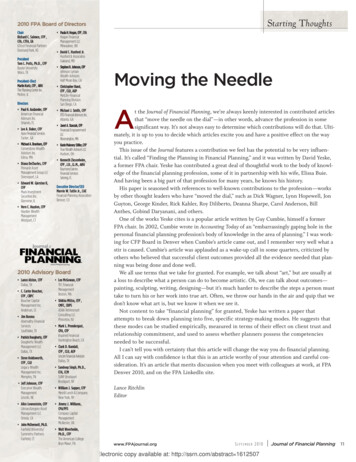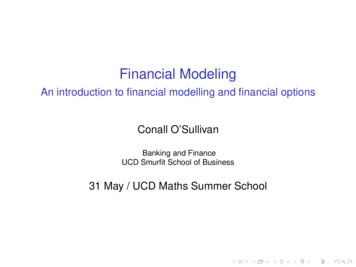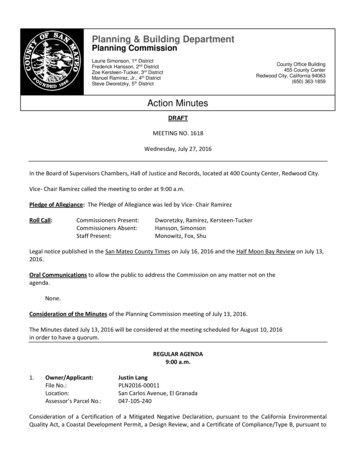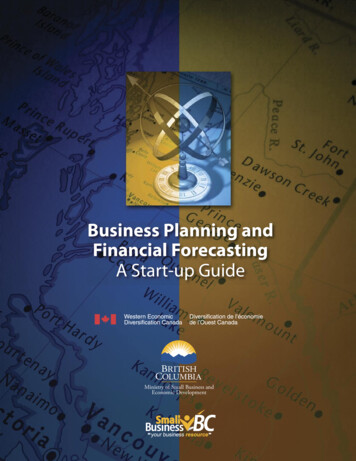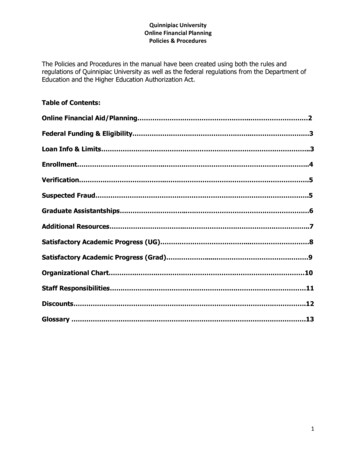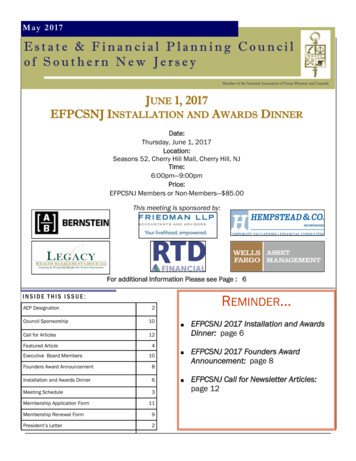
Transcription
An Introduction to Financial Planning Loughtons Independent Financial Advisers
ContentsWhat is Financial Planning? . 3Why Plan?. 4Why an Ongoing Process? . 5It’s important to remember . 5Our Approach. 6The Financial Planning Process. 7The Financial Planning Process Overview . 8 Loughtons Independent Financial Advisers2
What is Financial Planning?Financial Planning is an ongoing process to help you make sensible decisions about money that canhelp you achieve your goals in life; it's not just about buying products like a pension or an ISA.It might involve putting appropriate wills in place to protect your family, thinking about how your familywill manage without your income should you fall ill or die prematurely, spending money differently, butit involves thinking about all of these things together i.e. your 'plan'.At Loughtons we help you to build a plan by following the financial planning process. Thisencompasses 6 steps:1.2.3.4.5.6.Establishing your goals in life – over the short, medium and long term.Working out what assets and liabilities you have – and recording this information in writing.Evaluating your current financial position – how close are you to achieving your goals?Developing your plan – creating a ‘route map’ for achieving your different goals.Implementing your plan – making the changes and making it happen.Monitoring and reviewing your plan at least yearly and making adjustments when needed. Loughtons Independent Financial Advisers3
A goal without a plan is just a wish.Antoine de Saint-ExuperyFrench writer (1900 - 1944)Why Plan?We are living in very difficult financial times and life is a real struggle for lots of people.However difficult your situation, you will be better off addressing the situation, taking controland focussing on a realistic goal than allowing the situation to control you.For all of us there are things that we would like to achieve in our lives: in order to achieve themwe need to be focussed and financially ‘organised’. This is the essence of Financial Planning.Rather than just wishing that you could do something or have something that’s important to you, whynot apply yourself to make it happen using the process of Financial Planning?As well as realising your dreams at the end of the process, you will have a sense of achievement: inaddition you will feel in control and have the comfort of knowing that your financial life is ordered.Your plan will provide you with a financial roadmap which, if you follow it correctly, will lead youto where you want to go.In order to be effective your plan must be: Agreed with your partner, if you have one. Are your goals also his/her goals? In order to besuccessful you will both need to be committed and to enjoy your achievements as you progresstowards your goals.Realistic and achievable: you need to be sensible about what you are setting out to try andachieve if you want to avoid disappointment.Written down: if it’s not written down, it doesn’t exist!Regularly reviewed and updated: in order to keep your plan on track you need to regularly revisitit and repeat the whole planning process to keep it up to date. Loughtons Independent Financial Advisers4
Why an Ongoing Process? .because things change and these changes can have a significant impact upon the direction thatyour planning may need to take.These could be personal changes in: Your personal circumstances such as marriage, divorce, additions to your family, ill-health or achange of job for example.Your assets – you may inherit money or other property.Your liabilities –may stop, start, increase or decrease.Your income – may increase or change, stop or start or the source of income may change.Your expenditure – may also increase or decrease. For example, you may start or finish paying amortgage.Your surplus – How much of your income is surplus (or is there a deficit if you are overspending).This is essential to identify.Your views & opinions, for example, on the risks you are prepared to take, your views oninvestment and your lifestyle balance may all change over time.Or they could be something that is outside of your personal circumstances or control: A change in government policy, for example – changes to the amount of tax you will pay orchanges to when you will receive your state pension and how much you will be paid.A change in the political or economic environment.Stock market highs and lows.Property market changes.Population change.Work changes such as relocation or market closure.It’s important to remember Everyone is different and no two people will have the same financial plan. Your plan is unique to you. Loughtons Independent Financial Advisers5
Our ApproachThe traditional financial advisory business model was based around the concept that following aninitial consultation, a client would buy a financial product from the adviser which generated a fee orcommission.At Loughtons we offer a different approach. Whilst we recognise the importance of products, ourprimary purpose is to help you plan effectively.Our success has been built on three simple maxims – integrity, professionalism and impartiality. Weoffer a high quality bespoke service to clients over the long term, ensuring we deliver financialplanning strategies that fulfil our client’s requirements. This ethic has helped us to retain a highdegree of loyalty from our clients and other professionals with whom we work.We add value in a number of ways. Our aim is to work in partnership with you to help you to achievethe following: To Be Financially Well-Organised - To create a financial plan that will give you a clear grasp ofyour present financial situation and help you make the most effective use of your resources toachieve your goals and objectives.General Lifestyle - To define you and your family’s version of a desirable lifestyle and achieve itas soon as possible.Financial Independence - To achieve financial independence no later than age.Financial Protection - To ensure that adequate provision is made for the financial consequencesfor the family of the death or disablement of you or your partner.Income Tax Planning / Current Cashflow Management - To minimise your income tax liability,produce an analysis of your personal expenditure planning assumptions and to ensure that yourcash inflows are sufficient to cover your desired cash outflows.Investment Planning / Future Cashflow Management - To estimate future cashflow on realisticassumptions and to develop an investment strategy that will enable you to invest your capital andsurplus income in accordance with risk / reward, flexibility and accessibility standards with whichyou are comfortable.Estate Planning - To reduce the tax liability likely to arise on the death of yourself and yourpartner and to ensure that your estate is distributed to your beneficiaries as intended. Loughtons Independent Financial Advisers6
The Financial Planning ProcessThe Financial Process that we use is outlined below:1. Initial Consultation Meeting2. Discovery Meeting / Factfinding3. Presenting Solutions4. Implementing Recommendations5. Ongoing ReviewThis is process is perpetual. Things always change so adjustments will be needed and these shouldbe reviewed ideally at least annually.OngoingReviewImplementingRecommendations Loughtons Independent Financial AdvisersDiscoveryMeeting /FactfindingPresentingSolutions7
The Financial Planning Process OverviewAn overview of each step is outlined below:Initial ConsultationThis is always at our expense and places no obligation on you to engage with our services.The purpose of the meeting is to familiarise ourselves with each other, explain our philosophy andmethod of operating and establish your advice requirements. It is also important at the outset that youunderstand how we work, what we expect from our clients and what you can expect from us. We willoutline the various services available together with the fees and costs involved.Discovery Meeting / FactfindingThis will involve the gathering of information as we seek to get to know you, your requirements,priorities, goals and objectives. We will look to understand where you are now, how your financialplanning has evolved and where you aspire to be. We will also outline the various risks that you mayencounter in your journey. This step may involve the use of cashflow planning software.Presenting SolutionsWe will research appropriate solutions to match your stated goals and objectives based on theinformation you have provided. We will present these to you in writing and this will also involve adiscussion of the topics covered at this meeting.Ongoing ReviewOften people set up financial plans with good intentions but these fail to meet their expectations dueto the lack of an ongoing review against their original objectives (Would you buy a new car and neverget it serviced?). Clients benefit as they value a relationship with an adviser who is fully aware of theirfinancial affairs and is committed to reviewing them whilst taking account of any changes in personalcircumstances, goals, objectives and legislation. This step may involve the use of cashflow planningsoftware.Initial or Additional Advice ServiceInitially or at any time during your ongoing relationship with us, there will be times when you will haveadditional financial planning needs, over and above those covered by our ongoing review service. Forexample, inheriting money, investing further funds, protecting your family or moving house?These will involve additional work in recommending solutions to you, to ensure that these complementand enhance your existing arrangements.It’s not how much money youmake that matters but how muchmoney you keep—and how longthat money works for you.Robert Kiyosaki Loughtons Independent Financial Advisers8
Please note that this document does not constitute financial advice.For further information, please contact hone 01626 833225 Loughtons Independent Financial AdvisersFax 01626 8340669
3. Evaluating your current financial position – how close are you to achieving your goals? 4. Developing your plan – creating a ‘route map’ for achieving your different goals. 5. Implementing your plan – making the changes and making it happen. 6. Monitoring and reviewing your plan
